Being a human is a difficult task nowadays with many diseases in the world in which infertility is one of them. Refrain the infertility issues or cases, IVF specialists or doctors endeavor to reduce the unsuccessful rate in fertility treatment whether the case of abroad or foreign infertility couples. India is a leading destination for IVF treatment under evidence of previous conquest to enhance the IVF success rate in first attempt.
Theoretically, IVF treatment is a disassembler remedy in the medical world cause of it consists several risks or damages while treatment as per the patient’s censorial condition. In this conversation, we’ll bring certain key elements that justify the exact result or score of IVF success rate in first attempt or its other components in the following sentences. Let’s take a closer look at the preconception in the manner of a concise path.
What Is The IVF Success Rate In the First Attempt? – IVF Success Rate In Initial Attempt
The IVF success rate on the first attempt widely depends on various factors such as patient age, embryo quality, healthiness, and other causes that might be a string to stop the chain of successful pregnancy or success rate in the furthermore fertility treatment. On average, we can estimate the success rate is around 30 % to 45% in the first attempt of IVF treatment. On the other hand, IVF treatment in India is going positive if the age of infertile women is met with the chart of normal age except for fertility diagnoses. 20% chances of successful fertility treatment have been failed due to low-quality eggs over the bad condition of fertilized eggs or health.
In other cases, the fertility center’s reputation or what type of IVF procedures is used during the IVF treatment. Costs of IVF treatment are also a considerable point that causes an effect to decrease in the success rate in the first attempt. Important factors also include the fertility clinic’s experience, the technology employed, and the customized treatment plan.
The likelihood of success can be increased by using sophisticated methods including blastocyst culture, genetic testing (PGT), and embryo freezing. Changes made in later cycles frequently increase the chance of a successful outcome, even though the initial cycle may not always result in pregnancy. To increase their chances of success, couples are advised to maintain their optimism and talk about tactics with their fertility specialists.
Check The Factors Of Increasing Success Rate In First Attempt In India
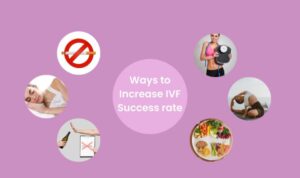
It takes a mix of medical knowledge, lifestyle changes, and the application of cutting-edge technologies to increase the success rate of IVF on the first try. The following are some important factors:
Age and Health
Because their eggs are of superior quality, women under 35 often have higher success rates. Fertility is increased by leading a healthy lifestyle that includes frequent exercise and a balanced diet.
Customized Treatment Programs
Selecting a reputable facility with skilled professionals who create treatment programs according to each patient’s needs might have a big impact.
Embryo Quality
Using high-quality embryos improves the likelihood of implantation. This is often accomplished by blastocyst transfer (day 5 embryo).
Genetic Examination (PGT)
Before conception By ensuring that only genetically sound embryos are chosen, genetic testing lowers the chance of miscarriage.
Uterine Health
For successful implantation, the uterine lining must be prepared using either natural or pharmaceutical means.
Advanced Methods
In certain situations, methods such as aided hatching or ICSI (Intracytoplasmic Sperm Injection) for male infertility produce better results.
Lifestyle Changes
Success rates are positively impacted by abstaining from alcohol, tobacco, and caffeine while controlling stress.
Expert Monitoring
To guarantee ideal timing and reduce problems, close observation is maintained during ovarian stimulation and embryo transfer. Couples can increase their chances of success on their first IVF attempt by concentrating on these criteria.
Does IVF Treatment Usually Fail First Time? ICSI Vs IVF Success Rate
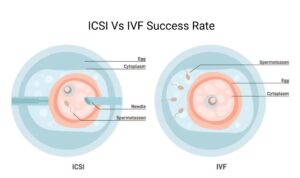
Couples frequently face early failure, and IVF treatment does not guarantee success on the first try. Many variables affect IVF success rates, such as the woman’s age, the quality of her eggs, the health of her sperm, the state of her uterus, and the clinic’s and the doctor’s level of experience. According to statistics, women under 35 have a 30% to 50% chance of success with their first IVF effort; however, this rate declines with age.
Poor embryo quality, problems with implantation, chromosomal abnormalities, or underlying medical disorders that were not discovered before the surgery can all be causes of failure. Other contributing variables may include lifestyle choices, emotional stress, or a poor reaction to ovarian stimulation. A failed first cycle can be discouraging, but it does not guarantee that subsequent attempts will be unsuccessful.
With protocol modifications, improved embryo selection, or lifestyle alterations, many couples experience success in consecutive rounds. The likelihood of success in the following cycle can be considerably increased by speaking with a fertility professional to determine the causes of failure and developing a customized strategy.
What Age Has The Highest IVF Success Rate In India?

In India, women younger than 35 usually have the highest IVF success rates. The odds of a successful IVF conception are greatly increased at this age because women often have better ovarian reserves, higher-quality eggs, and fewer fertility-related issues. The clinic and other specific criteria can affect the success rate, which can vary from 40% to 50% per cycle for this age group.
IVF success rates gradually diminish as women age because their eggs become less abundant and of worse quality. Women between the ages of 35 and 40 have a success rate of about 30%, and those over 40 have a success rate of 10% to 15%. Even if older women might benefit from new reproductive technology like genetic testing and egg donation, younger age is still crucial for the best IVF results.
Given that age has a major impact on fertility and treatment outcomes, couples contemplating IVF are advised to seek treatment as early as possible to increase their chances.
Does IVF Treatment Have A 100% Success Rate?
The success rate of IVF (In Vitro Fertilization) therapy is quantifiable, but it varies based on meticulous factors, including the age of the woman, the underlying cause of her infertility, the quality of the embryos, and the fertility clinic’s level of experience. Because their eggs are usually of superior quality, women under 35 have an average IVF success rate of 40% to 50% per cycle. The success rate drops to about 30% to 35% for women between the ages of 35 and 40, and to about 10% to 15% for women over 40.
The utilization of cutting-edge methods like ICSI (Intracytoplasmic Sperm Injection), genetic testing, and donor eggs or sperm when required are additional elements that affect the effectiveness of IVF. Another important factor is the reproductive clinic’s quality, which includes the lab standards and the expertise of its doctors. Even though IVF cannot ensure pregnancy, its success rates have increased over time, giving many infertile couples hope.
What Are The Factors Impacted To Increase IVF Success Rate?
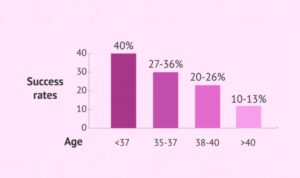
Lifestyle decisions are also very important. Fertility results can be considerably improved by controlling stress levels, quitting smoking, drinking less alcohol, and maintaining a healthy weight. Reproductive health also depends on nutritional balance, which includes supplements like folic acid.
Crucial factors are the fertility clinic’s caliber, experience, and doctors’ knowledge. The chances of success are increased by sophisticated lab equipment, accurate embryo cultivation methods, and knowledgeable embryologists. Methods such as PGT (Preimplantation Genetic Testing) or ICSI (Intracytoplasmic Sperm Injection) might also be helpful, particularly when male infertility or recurrent miscarriages are involved.
Higher success rates are also a result of using donor eggs or sperm when necessary and adhering to individualized treatment plans based on a patient’s medical background. Finally, couples can manage the process with a positive perspective by receiving emotional and mental support through therapy or support groups, which can enhance the overall experience.
Conclusion – IVF Success Rate In First Attempt
Glad to express all significant keys in the upper case of content, now we have reached the final destination where should wind up all essential things in one bunch. Read more contents on our official website, for instance, www.worldfertilityservices.com that also offers a variety of IVF treatments as per patient health condition or financially. We hope that you have understand all aspects that we have discussed by delving into a deep research.
Table of Contents

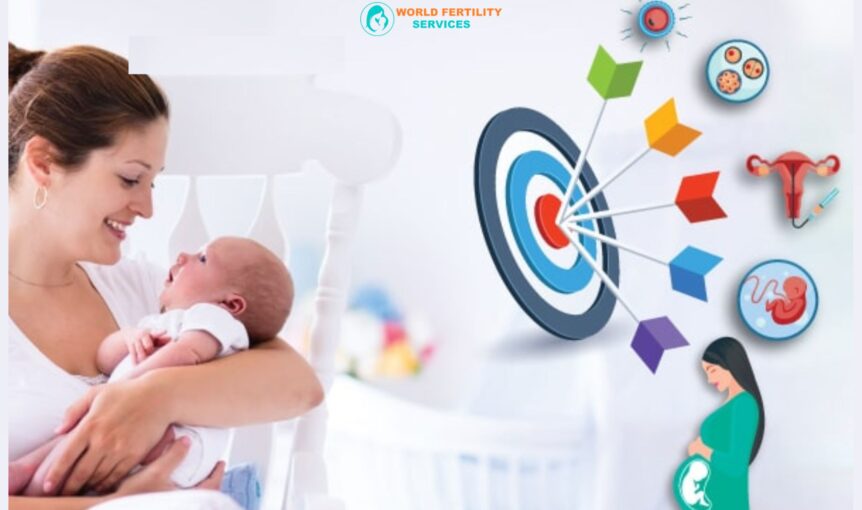
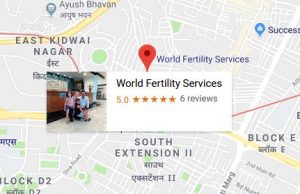
 WhatsApp us
WhatsApp us